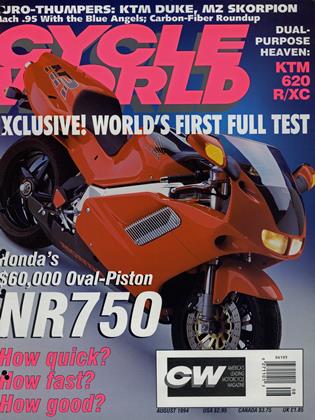A MAN AND HIS MOTORCYCLE
THE ACCOUNTANT WHO SAVED MZ
DRESSED IN A BUSINESS SUIT AT A TRADE show, glasses glinting in the light, 37-yearold Petr-Karel Korous looks like a corporate high-flyer. And that's just what he was before he bought a bankrupt relic of the former East Germany. Then you see him in leathers and helmet at the press launch of the Skorpion and realize how unreliable first impressions can be.
This is a guy who’s been riding motorcycles since he was 16, who was trained as an accountant with Coopers & Lybrand, and who became the youngest-ever director of Siemens-Nixdorf computers. Korous was called in as a consultant to find out how to privatize MZ, employing more than 3000 people at the time of German reunification five years ago. A damning report from BMW declared MZ to have “No substance, no new models, no products worth selling and no future.” Korous bought the company anyway.
Why? He says, “The people. MZ workers were very unusual by the standards of DDR industry-they were actually very proud of their products, and had a fierce loyalty to the company. So I decided to become personally involved-anyway, it meant I could ride a bike whenever I liked.”
Korous took over the reins of MZ in July 1992, creating the new MuZ company and building it up from scratch. He started with 18 employees, and now has 240 workers making bikes in a new, purpose-built factory near MZ’s traditional Zschopau base. The first priority was to develop a stylish, appealing line of products that could be built on a cost-effective basis while the company ticked over making updated versions of the existing, obsolescent range.
“I must have talked with a dozen design companies between April and July of ’92,” says Korous, “but all of them wanted to sell me their ideas of what we ought to be building, rather than listen to what I had identified as our needs, and design something accordingly. Richard Seymour, of Seymour Powell, was the only one who listened to me.”
Korous decided to commission Seymour Powell to design a sporting Single, he says, because “There are no such bikes in the market today. A light, simple, good-looking motorcycle gives you so much fun to ride and offers style linked with economy.”
With finance provided by a $24 million loan from a
German bank, Korous revitalized the company in less than two years. Operating out of a new $6-million factory, MuZ is on target to build 10,000 motorcycles in 1994, with provision to expand production up to 30,000 units on a double-shift basis. That, of course, will entail further new products. It’s no secret that Seymour Powell has been working on a 125cc son-of-Skorpion powered by a Japanese engine, and is currently fast-forwarding a twincylinder roadbike using a Yamaha TDM850 engine.
So it appears that having reinvented the British Single in the guise of a Euro-mono, MuZ is about to do the same with the archetype British motorcycle, a parallel-Twin. Is nothing sacred?
 View Full Issue
View Full Issue
More From This Issue
-
 Columns
ColumnsUp Front
August 1994 By David Edwards -
 Columns
ColumnsLeanings
August 1994 By Peter Egan -
 Columns
ColumnsTdc
August 1994 By Kevin Cameron -
 Letters
LettersLetters
August 1994 -
 Roundup
RoundupMorbidelli's 24-Carat Motorcycle
August 1994 By Jon F. Thompson -
 Roundup
RoundupWestinghouse Puts A Charge Into Riding
August 1994 By Brenda Buttner




